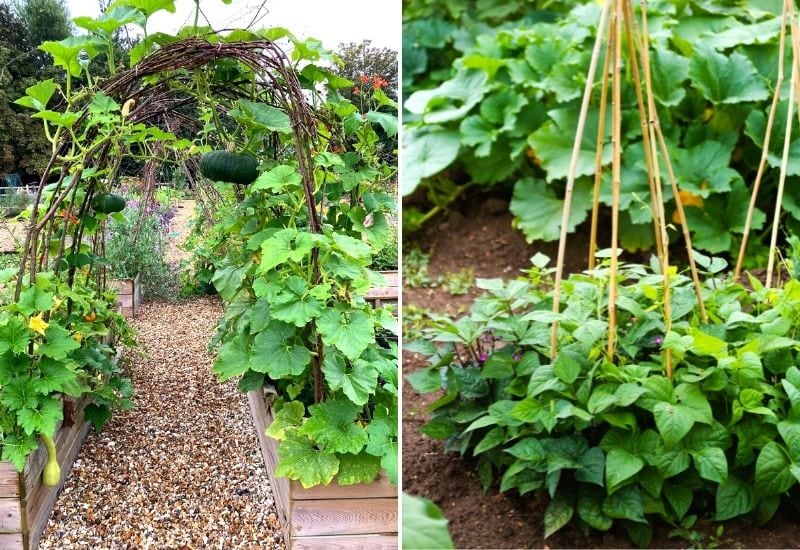
Living without property or space to have a garden can feel frustrating, but that’s where vining and vining vegetables come into play.
Growing fruits and vegetables vertically on trellis is a great way to grow more food in small spaces, and you aren’t limited with your choices for the vegetables that grow on vines.
These vine crops are surprisingly productive and you can trellis them up, and get them growing vertically with ease.
Even those of us with plenty of large for raised beds or in-ground gardens enjoy adding vegetable climbers. I grow vine vegetables over arches and trellises in my garden, adding beautiful detail to my garden while also providing food for my family.
If you’re interested in doing the same, here are some vining and climbing fruits and vegetables you can easily grow vertically on a trellis, stake, cage or fence and why you should consider vertical gardening even if you don’t need to save space.
4 Great Reasons To Grow Vegetables And Fruits Vertically
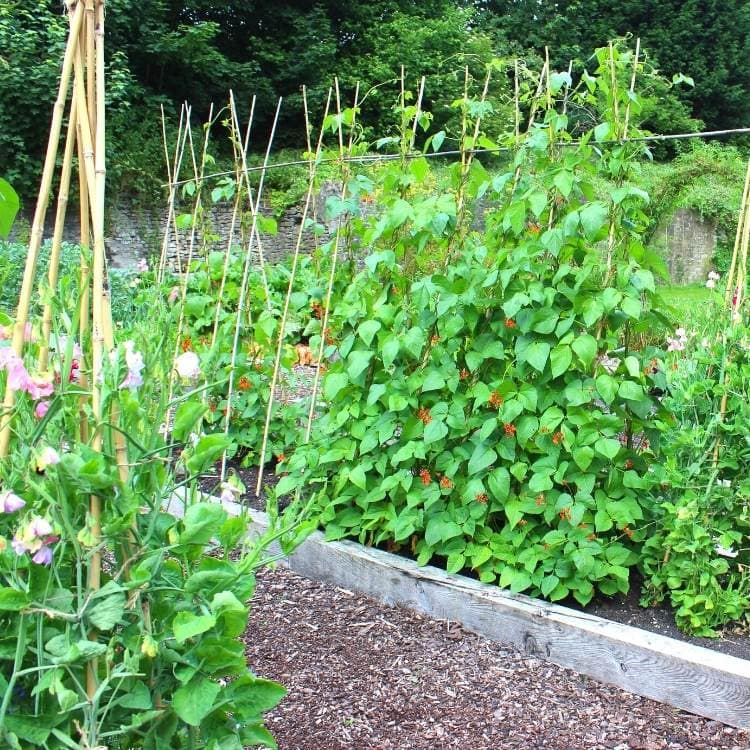
So, why would you want to take the time to practice vertical gardening?
Some particular benefits make this a popular choice amongst all gardeners.
Remember, even if you have space for a large garden, you can incorporate vertical gardening aspects to add different perspectives and architectural details to your garden.
Some things to consider about vertical gardening include:
1: You Can Grow More Food in Less Space
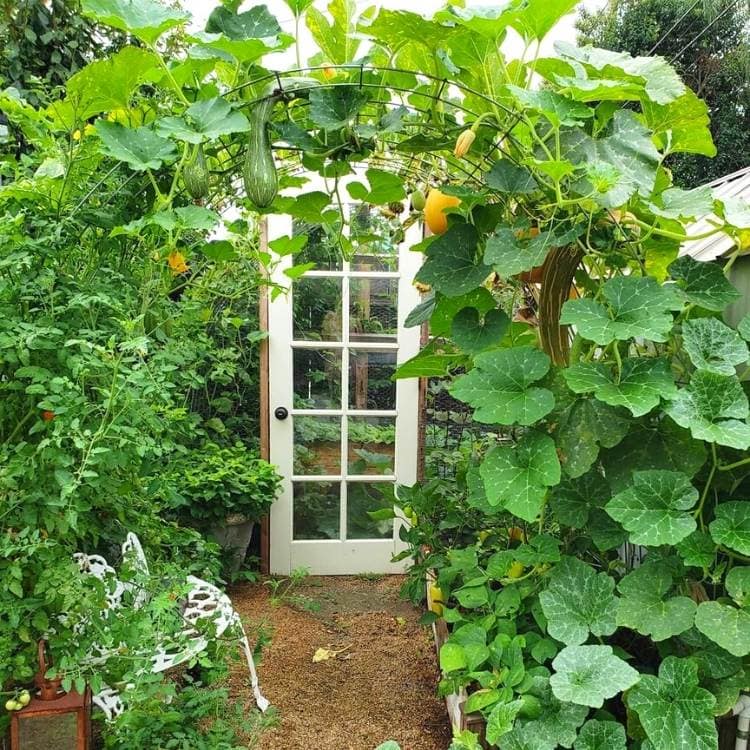
One of the most significant benefits is that you can have an abundant harvest when you grow vegetables vertically. Some studies show that some veggies yield two or three times more in the same amount of space.
It’s not entirely positive why this is true, but it could be that the entire plant receives more air circulation and ample sunlight.
2: Growing Vertically Reduces Diseases and Pests
Using a trellis for certain vegetables can reduce insect damage and the spread of diseases.
Trellising fruits and vegetables helps because it improves air circulation around the plants, which decreases fungal infections. When you keep the foliage off the ground, it reduces soil-borne diseases that often spread rapidly throughout gardens.
3: Harvesting Is Easier
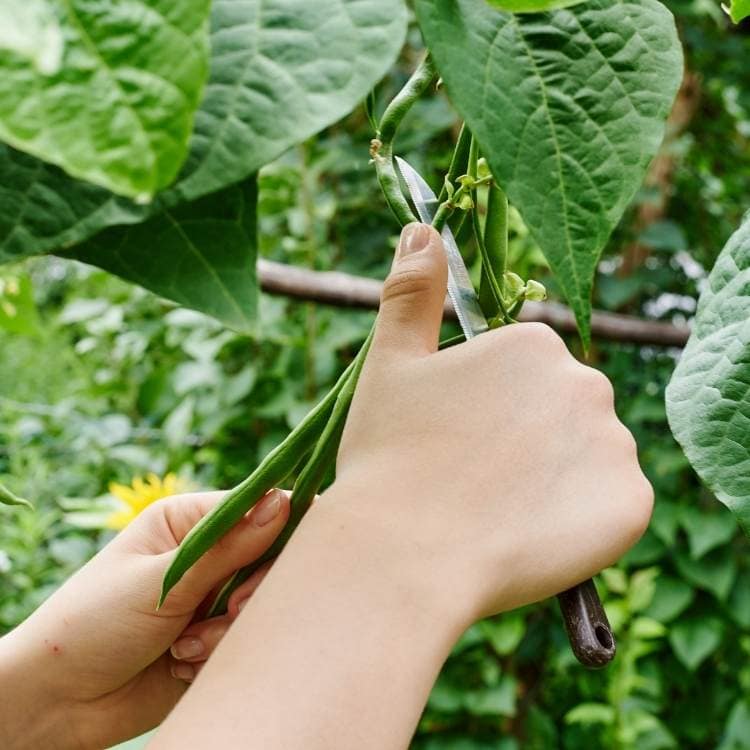
When you have over 100 green bean plants, bending over to pick the harvest leaves a sore back.
The same thing goes for cucumbers, tomatoes, and other veggies.
When you have vertical crops, you don’t need to bend over; you’re looking at a vertical structure, and while you might need to pick some at the bottom, most will be eye level or even above!
4: Clean Fruits
Some crops, like edible gourds, curve while growing, but if you keep them off the ground, they tend to grow straight without any dirt.
18 Vining Fruits And Vegetables to Grow in Your Vertical Garden
Here are some of the best climbing vegetables (and fruits) ideal for growing vertically on a stake, trellis, cage or fence.
1. Bitter Melon
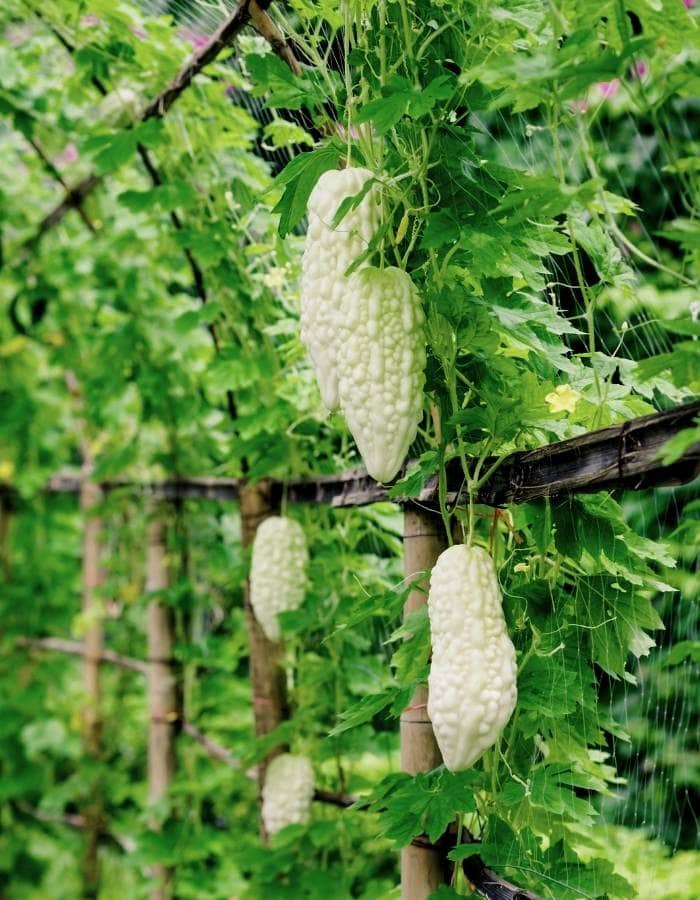
Here is a plant that is in the same family as cucumbers, squash, and watermelon. We could include them in the melon categories, but bitter melons deserve their spotlight. Not enough people appreciate this little melon.
Bitter melons are easy to grow, vigorously growing vegetables made for a trellis, arch, or pergola.
Typically, they grow the best in tropical or subtropical climate because they require full sunlight and a lot of it.
However, that doesn’t mean you shouldn’t try to grow them if you live elsewhere. Just make sure they have as much sunlight as possible.
Bitter melons typically reach about 8 inches long, and each plant grows about 10-12 fruits. These fruits do take an acquired taste; the name isn’t lying – they are bitter!
2. Chayote
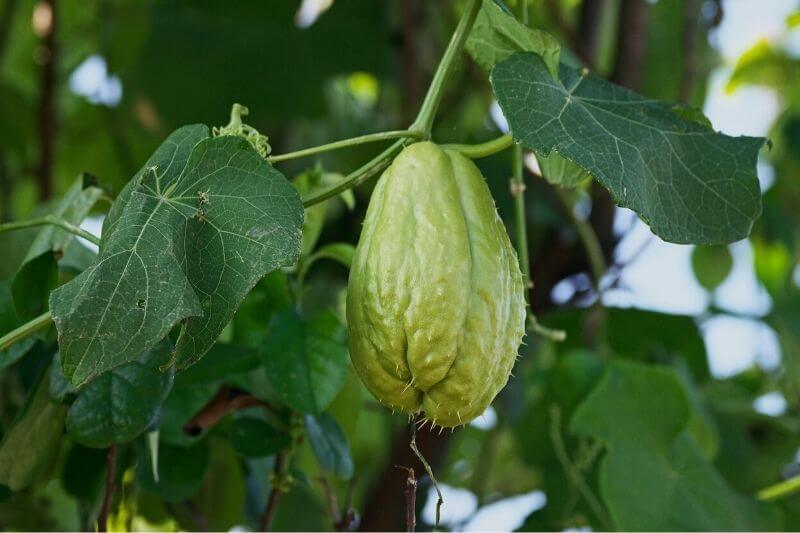
Chayote is a fruit rather than a vegetable, but it looks like a pale-green, pear-shaped pumpkin, and they thrive when grown on a fence or a trellis.
These fruits do very well when grown in subtropical to moderately cool climates without any issues. If you want to grow chayote in a colder climate, you will need to offer some protection as the temperatures dip down.
These plants thrive; each plant produces 50-100 fruits. So, one plant is sufficient for an entire family unless you REALLY love chayote.
It’s best if you pick them young because the skins start to get tough as the fruit gets longer.
3. Climbing Nasturtium
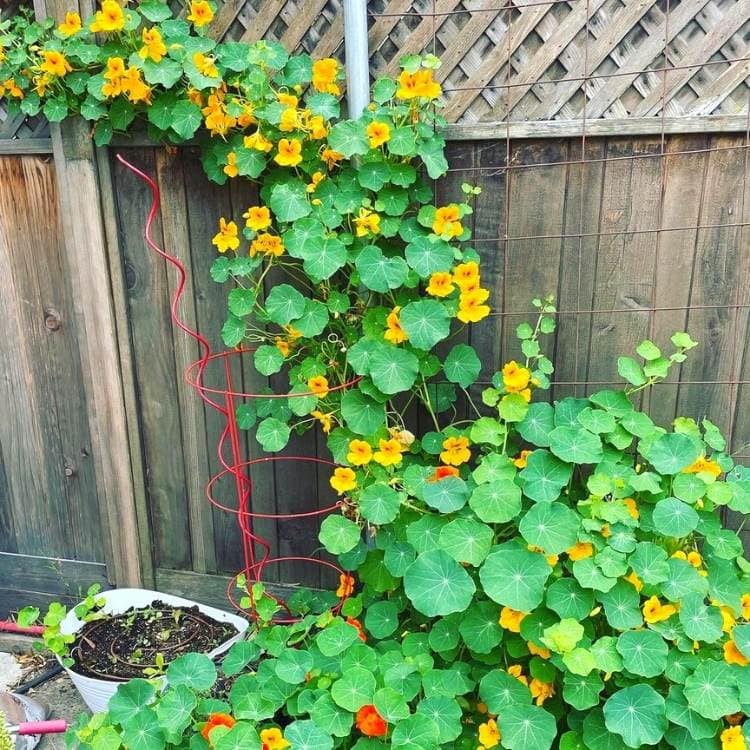
Even though nasturtiums aren’t a vegetable or even a fruit, they’re a delicious edible that you can add to your salads. The petals are a unique peppery taste that adds flavor to your dishes along with pops of color.
Adding flowers to your garden is very important. They can encourage pollinators while also trapping harmful pests away from your veggies.
Climbing nasturtiums are a fantastic choice. They grow fast, typically within four weeks of planting. These vining flowers can reach up to six feet tall, filled with bright colored, edible flowers. You can train them to grow up poles or trellis.
4. Cucumbers
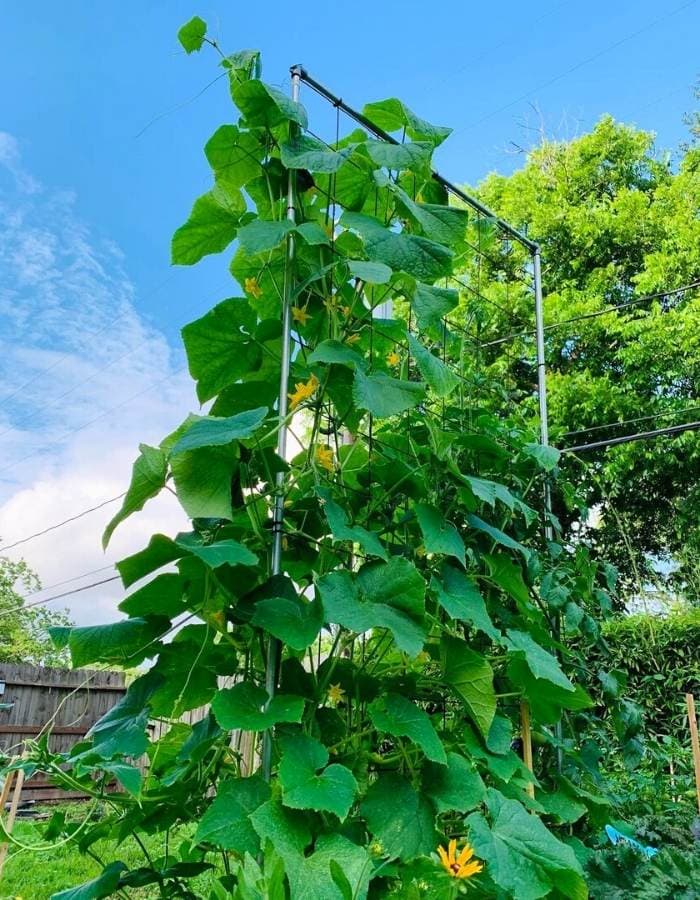
Cucumbers come in two varieties – bush or vining. I always select vining cucumbers; they have vigorously growing vines that stretch across the ground if you don’t provide a support system.
Cucumbers have little tendrils that allow the plants to grow up any trellis you provide.
One of the benefits of growing cucumbers vertically is that they have a lesser chance of developing diseases, such as powdery mildew, which tends to bother these plants.
5. Grapes
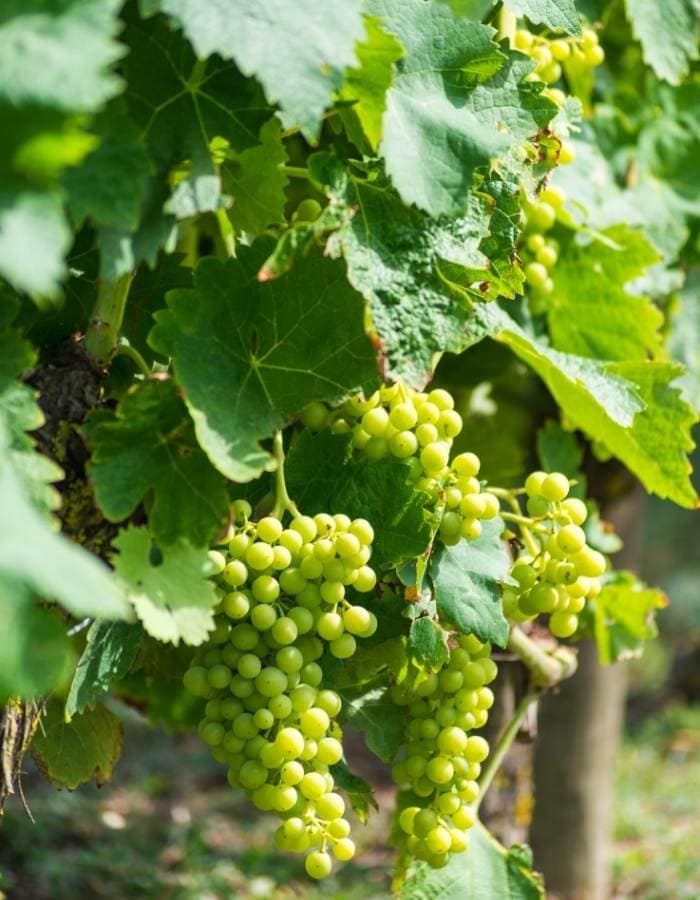
Even though they aren’t a vegetable, grapes deserve a spot on this list; what is a better vine than grapes? Well cared for grapevines can last for decades.
Want to know something fascinating? My family has continued to keep my great-great-grandparents home, as various people have lived there.
My grandmother planted grapevines as soon as they purchased this house over a century ago, and my grandfather built a beautiful arbor to hold them.
The family tends to these vines to this day, and they produce gallons of fresh grapes each year that we turn into wine. Grapes can be a family heirloom to treasure if you know how to take care of them.
This story shows a few things. First, grapevines are perennial, so even though they may take a few years to establish, they’re an investment.
Second, you need more than a trellis or an arch to support these. You won’t be able to move them, so it’s best to have a permanent structure, such as an arbor or a pavilion, for the vines to attach.
I highly suggest that you take your time learning how to grow grapes because they require a lot of pruning and care.
6. Hops
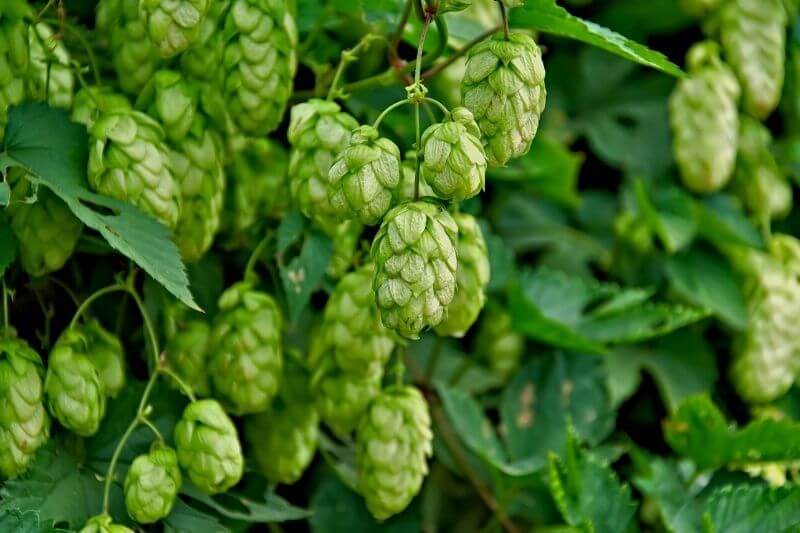
Are you interested in learning how to make beer at home? Hop is a fast-growing vine that does well in a vertical garden as well as in containers. Since hops like to spread and grow rapidly, they can overtake your garden in a flash.
The hop flowers can be used to make beer or be steeped to create a sleepy-time tea. Some people eat steamed young hop leaves; they’re viewed as a vegetable by many people.
Training hops to grow up a trellis, or another support system is easy and an effective way to keep the plant in check to the best of your ability, mainly if you have limited space.
It also helps to prevent pests and diseases which tend to bother hop plants frequently.
7. Kiwi

Not everyone can grow kiwis, which is disappointing because who doesn’t love a yummy kiwi? Kiwi fruits grow best in climates with short winters and long growing seasons without any frost or cold weather.
You might not know this, but kiwis are a perennial vine that takes up a lot of space.
Some of their vines can spread up to 20 feet long, so chances are you will need an entire support system just for your kiwi plants.
The nice thing is that they aren’t heavy, so you don’t need to worry about providing slings or hammocks for the fruits.
Considering how delicious they are, kiwi is worth the effort to grow.
8. Loofah
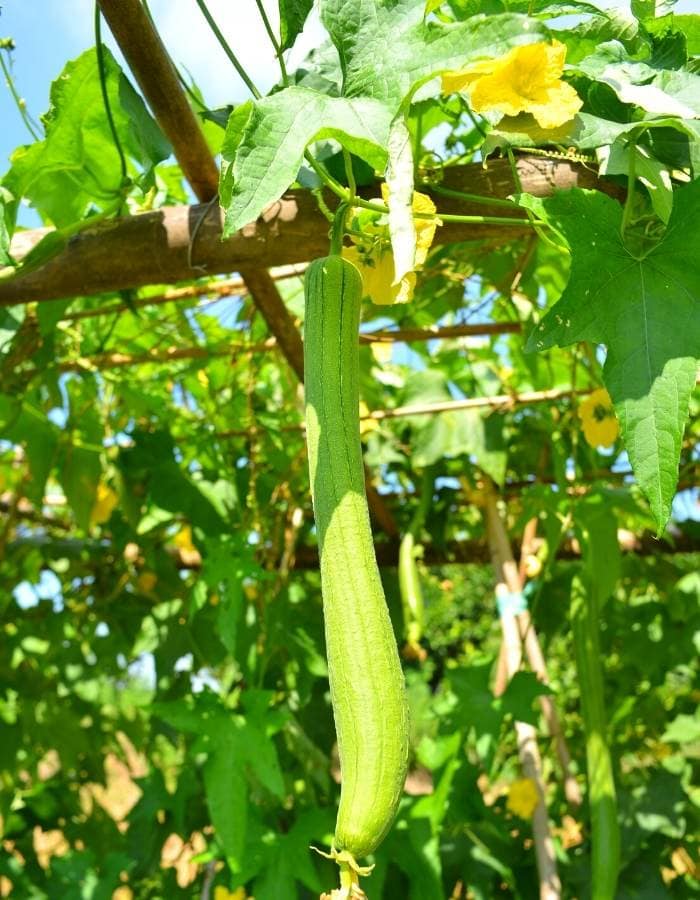
Recently, growing loofah has become a popular choice for gardeners. Loofah is better known as a natural sponge than a vegetable, but they are edible, believe it.
Loofah gourds can be eaten raw, similar to how you eat a cucumber or cook them like a squash.
Most people let the loofah gourds dry out and use them like a sponge. Either way is perfectly fine, or you might want to mix all of the possibilities.
Since they’re gourds, they need a heavy-duty trellis to support the growth of the plant and slings or hammocks to support the gourd. You don’t want the vines to snap as the gourds dangle down.
9. Malabar Spinach
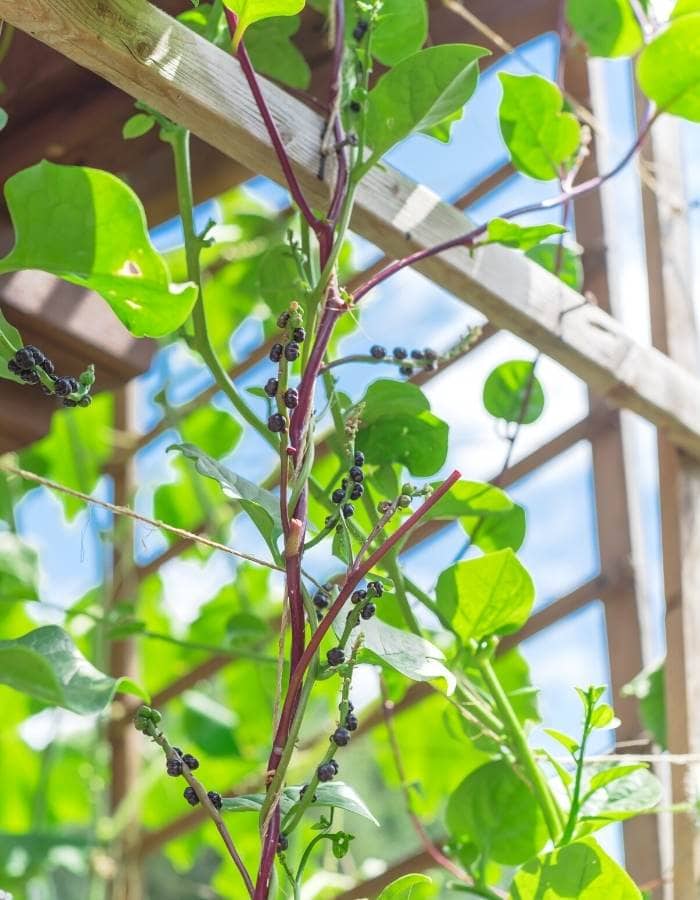
If you live in a mild climate without any dangers of frost, Malabar spinach is a tropical perennial you can grow Malabar spinach vertically. These plants thrive in temperate climates, producing rapidly.
Malabar spinach is a cut and come again vine, so you can continue to harvest whenever you want some spinach in your salad or soup. The plants grow up to four or five feet tall, producing green leaves with red stems.
10. Melons
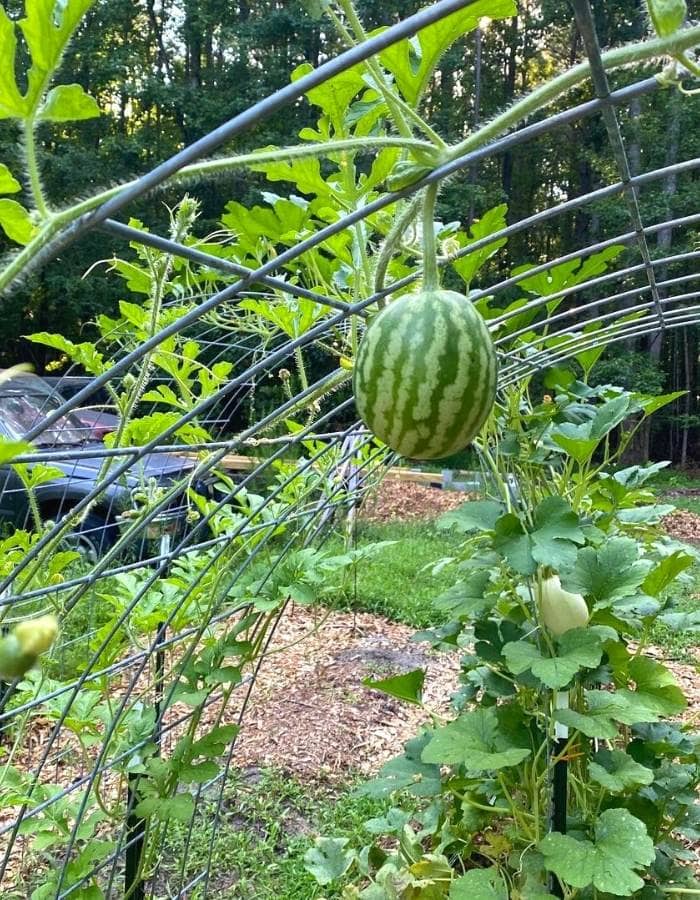
Most melons, such as watermelons, can be grown vertically as a vine fruits. Melons have some seriously long vines that can stretch across your garden. I should know; my watermelon vines are over six feet long and decided to mix with my pumpkins I thought that I planted far enough this year!
You’ll need a heavy-duty trellis, such as cattle panel, to support the vines and melons’ weight. Weave the vines through the trellis as they grow; they don’t have tendrils like cucumbers.
As they start to produce their melons, you’ll need to make slings to support the fruits. Pantyhose can be cut and fashioned into slings or hammocks to hold the weight of the fruit.
11. Passion Fruit

Unfortunately, not everyone lives in a climate that supports the growth of passion fruit. Only those living in USDA zones 9b to 11 can grow these South American native fruits.
They’re very cold intolerant, but if you have the right temperatures, they can bloom and grow rapidly, producing hefty yields of fruits.
Like grapes and kiwi, passion fruit vines are also perennial. They can be quite large, so you need to be sure that you have plenty of space to grow.
Since they’re perennial, it’s best to provide a permanent structure for them to grow up rather than something like a teepee that won’t last years and years to come.
12. Peas
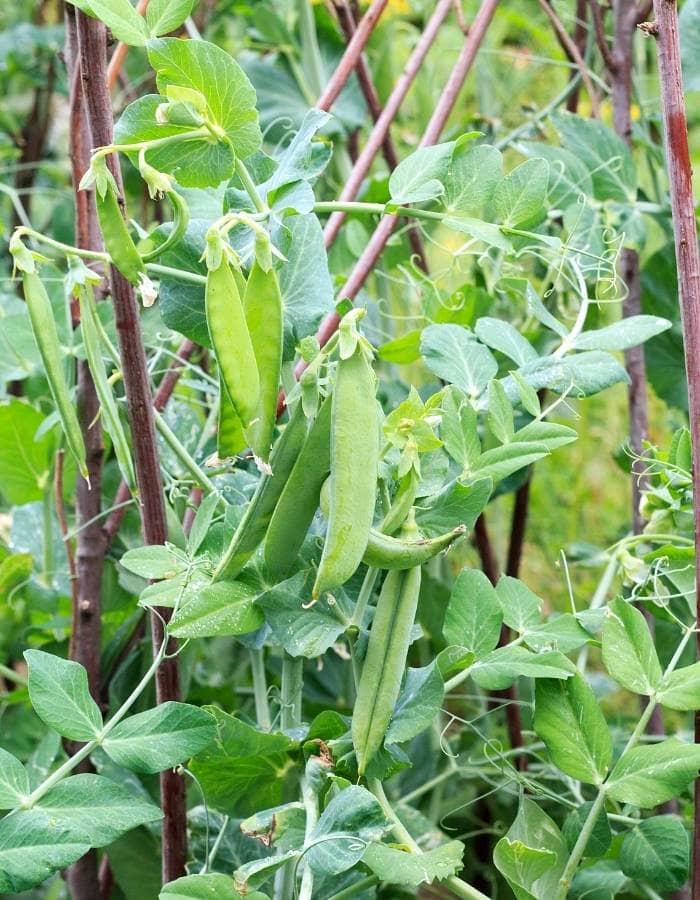
My kids love peas, and they’re one of the best vine vegetables to grow in the spring and fall. You can plant pea in the spring as soon as the soil is workable.
If you want to grow peas in the fall, sow the seeds in early-to-mid summer and provide plenty of moisture.
Peas come in many types and varieties, and the ones that grow taller than three feet need some support system.
We use arches, but stakes hung with netting, or a teepee works just as well. Mature pea vines are heavy, so whatever trellis you select needs to be able to support the weight.
Peas need to be harvested regularly, typically every other day.
13. Pole Beans
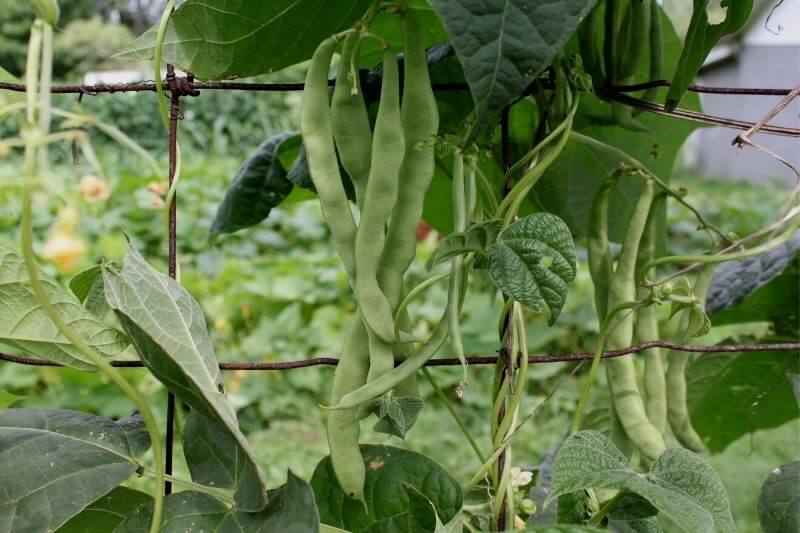
One of the best climbing vegetables to grow vertically are pole beans, which are essentially green beans grown vertically. Pole beans are very easy to grow, rapidly growing up and over the arches, teepees, or whatever structure you provide.
One of the benefits of pole beans vs. bush beans is that their harvest window is much longer, and some argue that they have a better flavor.
Bush beans harvest all at the same time, making the harvesting time intense. Pole beans come to harvest over an extended time, so you won’t find yourself drowning in beans.
Plus, it’s so much easier to harvest higher up than down on the ground. You can save your back a lot of pain.
14. Pumpkins
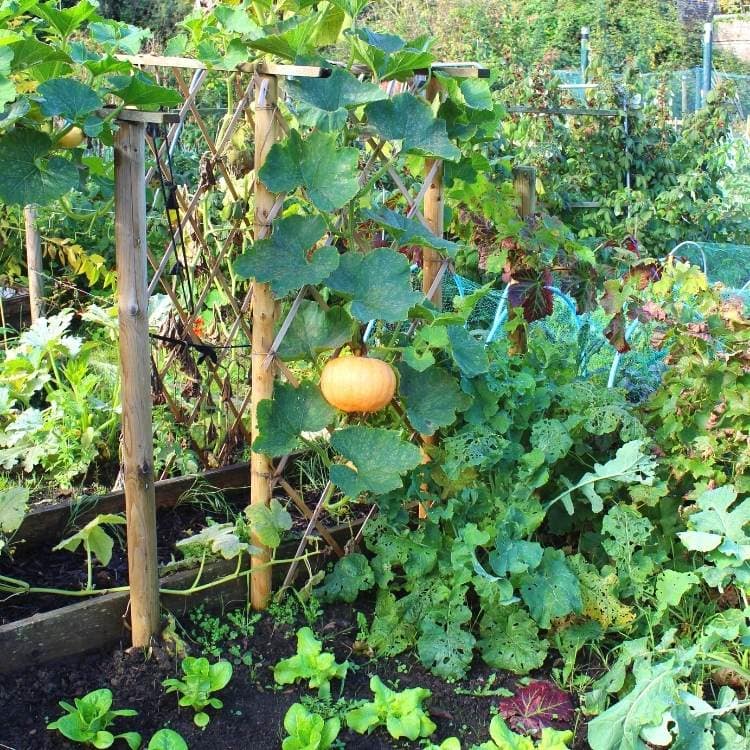
Large pumpkins won’t do so well on a support system; as you imagine, they would snap the vines.
However, small, pie pumpkins can be grown on a trellis so long as you create a sling or a hammock to support the fruit’s weight.
Pumpkin vines can grow to extraordinary lengths, sometimes reaching up to 20 feet long! That’s pretty crazy, but the vines can be pruned to be kept at a manageable length.
15. Strawberries
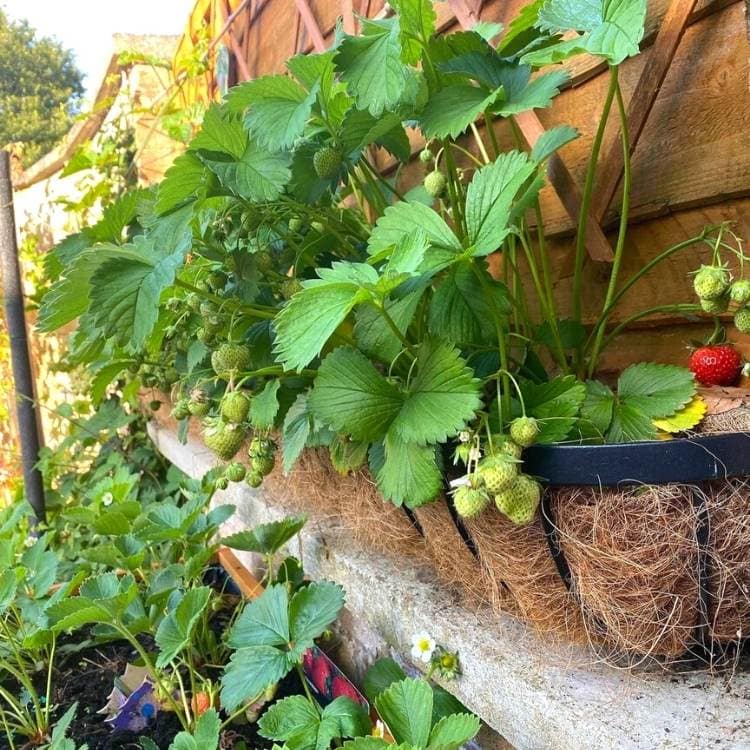
In truth, strawberries aren’t a vining vegetable; they’re a creeping fruit. That doesn’t mean you can’t provide them a structure to creep up!
Strawberry plants have the tendency not to stay where we put them, so that makes them a fantastic choice for vertical gardening.
You won’t need anything massive to support these plants; they don’t weigh a lot, but they’ll grow well each spring on your trellis!
16. Summer Squash
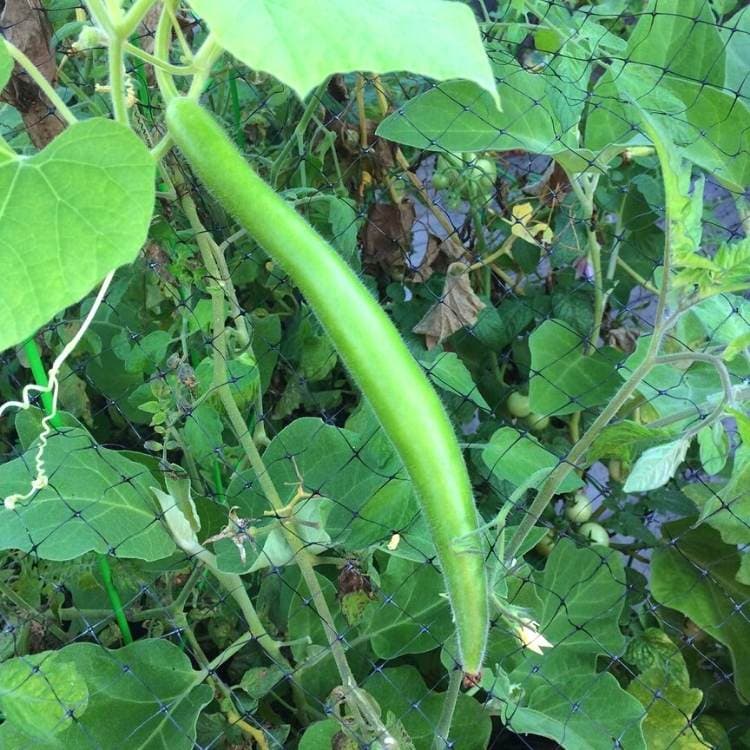
The most popular summer squash grown is zucchini, and if you’ve ever grown zucchinis, you know those plants take up some valuable space in your garden.
They overproduce and cause you to drop fruits off on your neighbor’s doorstep, but they also have no care in the world and will continue to grow massively large, choking out other nearby vegetables.
Using a trellis on a bush or semi-vining summer squash can be a bit tricky, but if you find a variety with long vines, they can grow vertically over a support structure with no issues.
Summer squash isn’t natural climbers but rather rigorous growers. You will need to secure the vines to trellis; you can do this either by weaving the branches in and out or using nylon mesh or ties to secure the vines.
Since the fruits are dense and could snap the vines, it’s recommended that you use mesh or nylon pantyhoses to create slings to hold the fruits as they grow.
17. Tomatoes
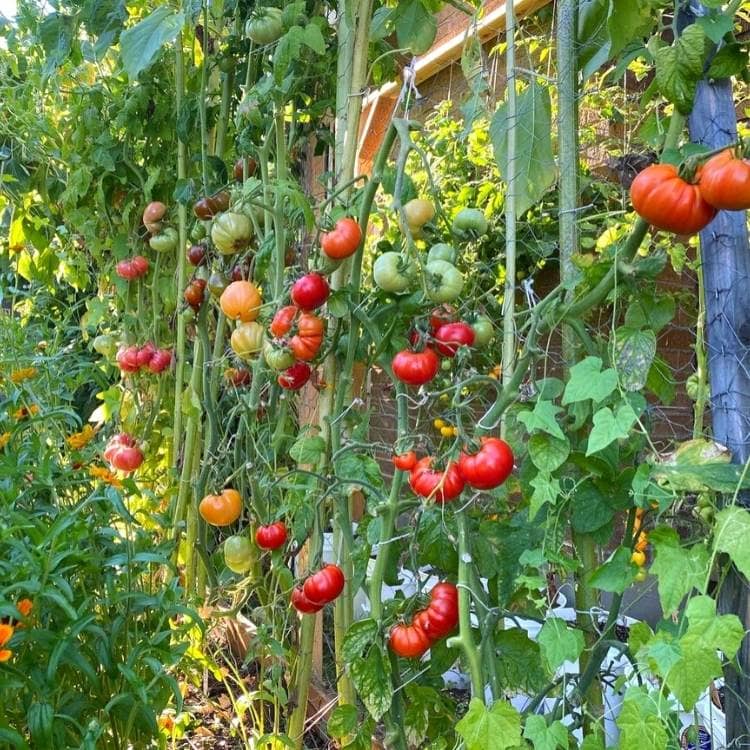
If you want to grow tomatoes as a vine, you’ll need to find indeterminate tomatoes, often called vining tomatoes. They aren’t natural climbers, so you need to continue to secure the plant to the trellis as it grows. Twine or tomato clips work well to hold the branches in place.
Even though they aren’t natural climbers, using a trellis is helpful for indeterminate tomatoes. It can help to reduce the risk of diseases or breakage due to wind or other weather.
Growing your tomatoes on a trellis also helps to provide more sunlight across the entire plant, increasing your overall yield.
Not all tomato varieties grow well in a vertical garden. Here are a few examples that you might want to try:
18. Winter Squash
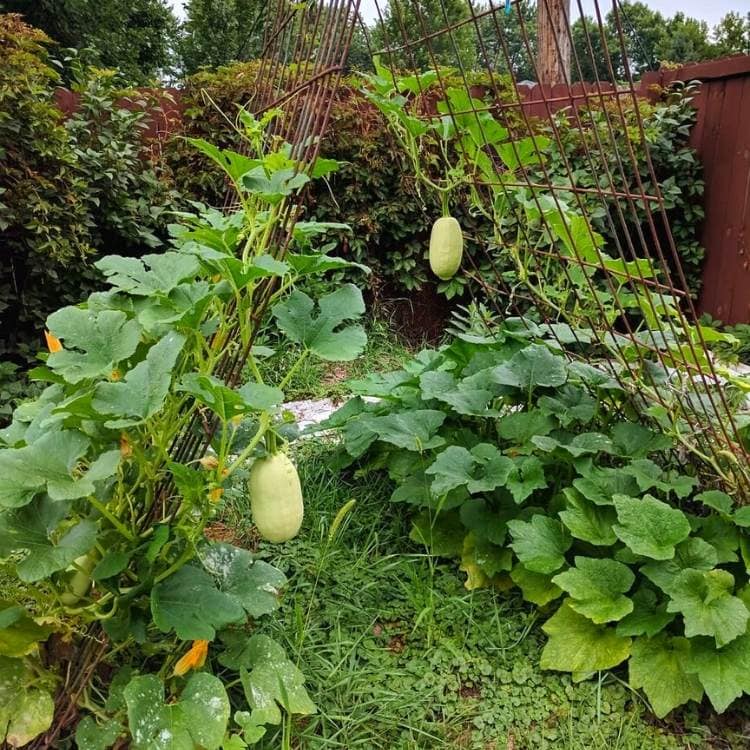
Last but certainly not least, you can grow winter squash up your support systems as well. Winter squash can be dense, but not all of them are huge. You can find some types that stay on the smaller side, such as acorn squash.
Winter squash will trellis itself, vining throughout your garden and wherever it wants to go. All you have to do is give it the idea that going up the trellis is the best place to head, and it will.
So, plant it near the trellis, and up it will go, but it’s a good idea to still attach the vines with some support of twine or vegetable tape.
If you want to grow some of the larger winter squashes for storage throughout the winter, you will need to provide durable hammocks or slings to support the fruit’s weight.
You Aren’t Limited!
When you decide to grow a vertical garden, don’t feel as if you’re limited by what you can grow. That’s the furthest thing from the truth.
You can find many vine vegetables and fruit to add to your garden that will happily grow up a support system and thrive, providing you with an abundant harvest in a small amount of space.

Written By
Amber Noyes
Amber Noyes was born and raised in a suburban California town, San Mateo. She holds a master’s degree in horticulture from the University of California as well as a BS in Biology from the University of San Francisco. With experience working on an organic farm, water conservation research, farmers’ markets, and plant nursery, she understands what makes plants thrive and how we can better understand the connection between microclimate and plant health. When she’s not on the land, Amber loves informing people of new ideas/things related to gardening, especially organic gardening, houseplants, and growing plants in a small space.

forgot. are my rows supposed to be North South or East west?
Amber, this Is an incredibly inspiring read on starting a trellis garden! I purchased Concord grapes, blackberries, a guava and fig tree and several different types of flowers and I’m still trying to figure out if I’m going completely hydroponic or part in ground and part water. But this helps me realize I can do so much in a vertical space, THANK YOU!!!! I wonder if you’re ever hired out for personal training on a Florida garden? I know I could gather others for a Florida gardening retreat! I lived in Burbank California for years and travel back to family and friends so if you have classes in person or online, please let me know! Thank you so much, you’ve been so inspiring today thank you!!!